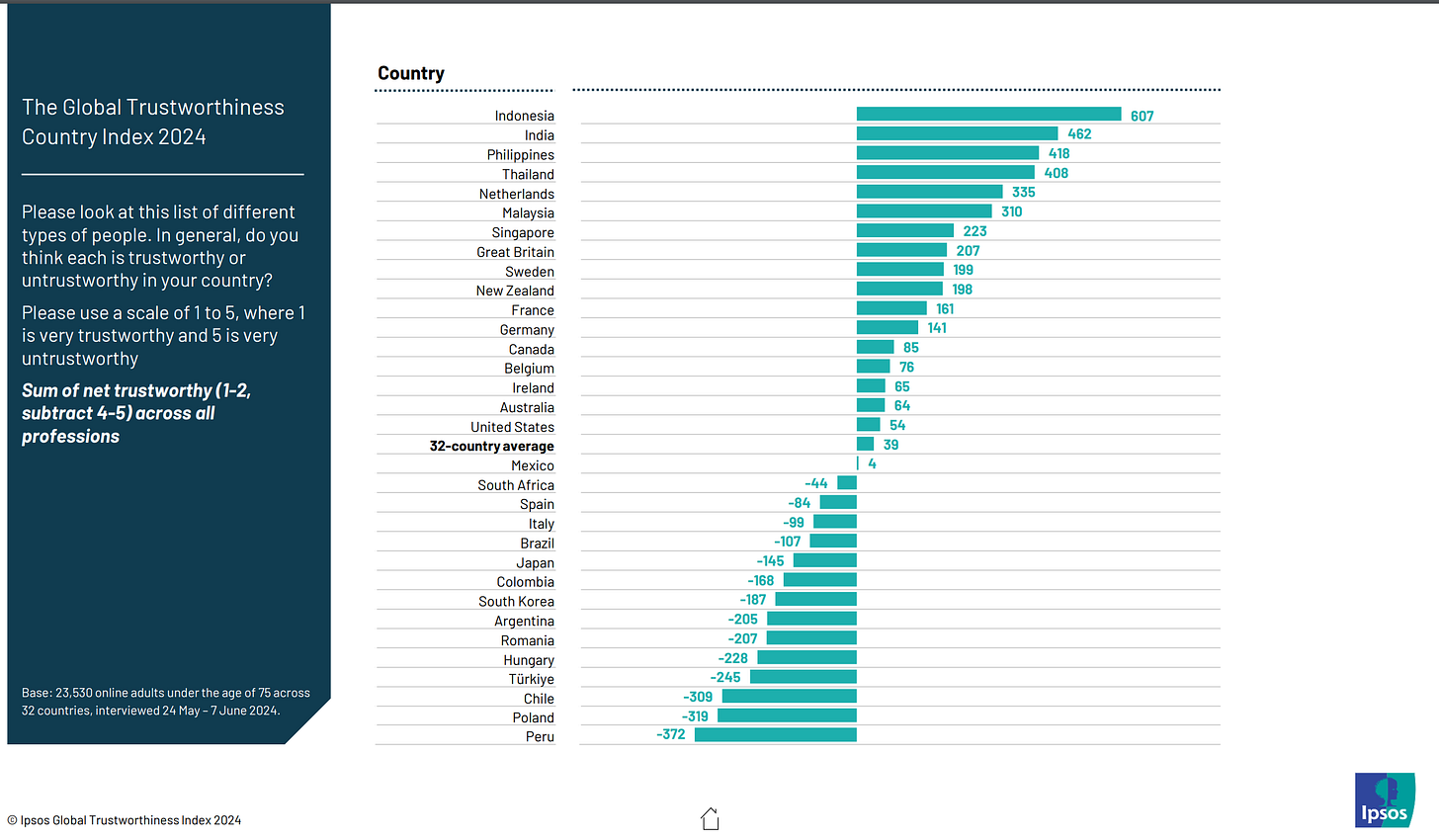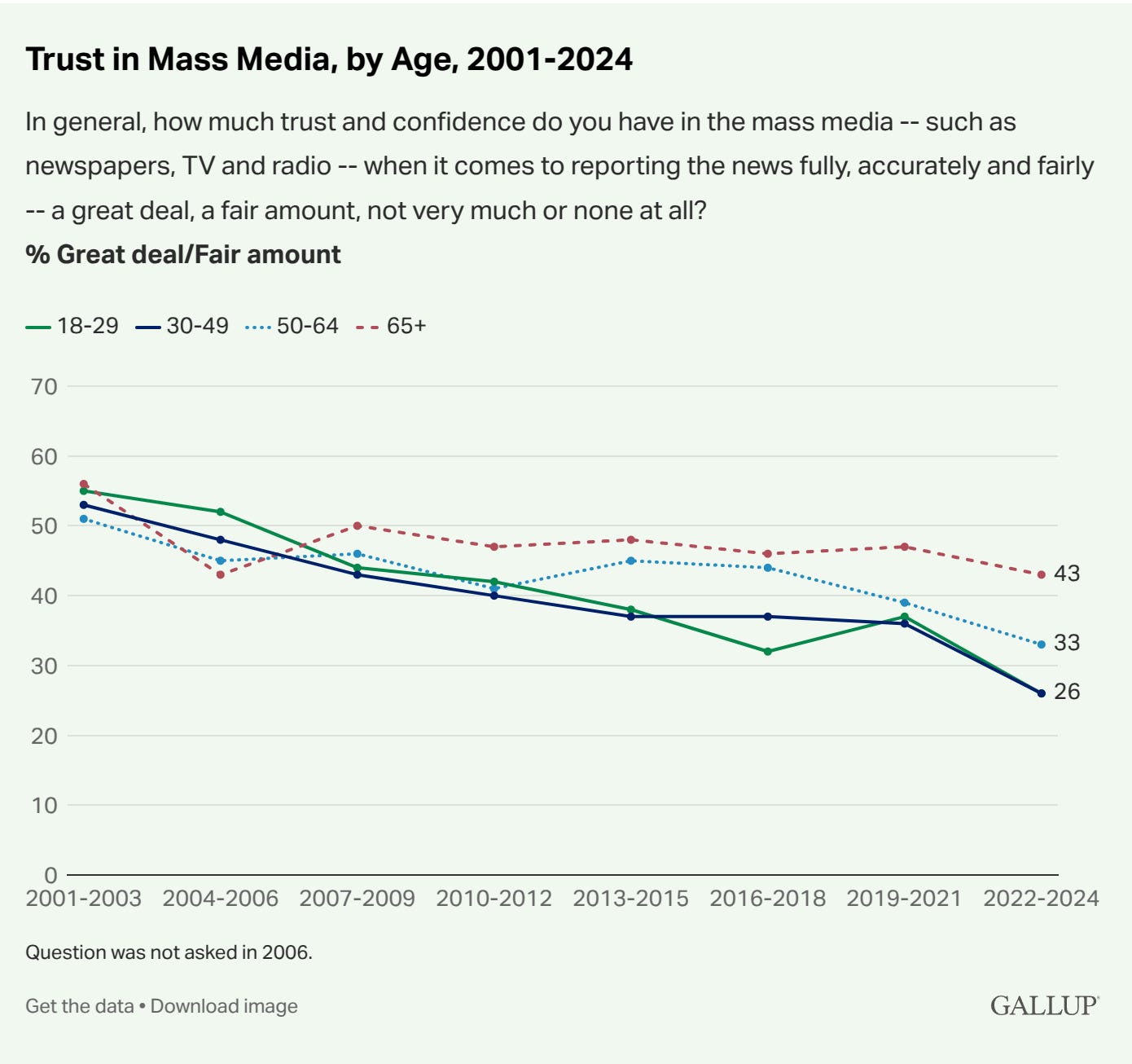Few people trust journalists
Is the time ripe for the media 2.0?
I was going to do a bunch of searchers to find polls of trust in different occupations by country. However, it turned out to be unnecessary because Ipsos has already carried out a 32-country survey. They asked people to rank each occupation on a 1-5 scale, which they then recoded into trust (4-5) or distrust (1-2). The global average is this:
There are substantial country differences, both in the mean trust and in specific occupations. Let's look at the former first:
If you are thinking, wait a minute, isn't India a country notorious for scams? Yes. I think this comes down to survey bias. We know that lower intelligence tends to make people prone to acquiescence bias, that is, just answering positively to any question, even if it contradicts prior answers. In this case, it results in higher trust in everybody since their questions are positively phrased. So there are two opposite factors causing the global variation, namely, acquiescence bias (towards positive) and the general level of trust in that country, which is also a function of how trustworthy people are. Looking at the above, we see that Asians give higher values (Indonesia, Philippines, Thailand, Maylaysia, Singapore, but not South Korea), while Amerindians/Latins give lower values (Peru, Chile, Argentina). Hajnal line Europeans are generally higher (Netherlands, UK, Sweden), and non-Hajnal line/post-communist Europeans are lower (Poland, Hungary, Romania).
With this in mind, let's look at journalists specifically:
So the people who trust journalists more are just those who trust everybody more in general (for the two reasons discussed above). Nevertheless, we see that journalists have negative net trust (trust-distrust) in every western country except for the Netherlands, where somehow they score a net of +20 (40 trust, 20 distrust). It's hard to believe the Dutch media landscape is different enough to account for this finding, but the Netherlands does have a uniquely open parliament system. In all but one democracies in the world, to get your party into parliament (senate/house), you need to secure at least X% of the vote as a minimum even though below X% would have given you a seat. This strong bias towards existing parties and against smaller parties in general results in a more slowly changing political landscape, and the benefit is that politics is less tumultuous, as there are fewer parties to deal with. The Netherlands is the only country (as far as I know) with no such threshold, and as a result, their 150-person parliament currently has a staggering number of parties:
Denmark is the second most democratic country by this metric, with a threshold of only 2% (Dutch is de facto 0.67% the vote required to gain 1 seat, whereas Denmark requires you to win 4 seats). Germany is on the low end of this index (5%), and thus it is common to see parties failing to meet it resulting in wasted votes.
Anyway, back to trust. What about changes? We just went through a global pandemic with lots of divergence in opinion. Did this affect anything?
If you squint, maybe yes. Scientists fall a few points in 2022, but not in 2021. Doctors increased from 2018-2021, but fell in 2022. What about age?
There doesn't seem to be any notable change with age, at least for these broader categories. If you check specific occupations, there are some obvious changes:
Familiarity breeds trust, and younger people are more familiar with social media influences (what we would call entertainers in the past) and trust them more.
The data do not appear to be available for download, so we cannot have a closer look at regressions unfortunately.
Denmark was not covered by the above study, but there is a similar long-running survey for Denmark (troværdighedsanalysen 2023):
(Google translate, hence the visual artifacts.)
The numbers match well overall. There's no particularly high trust in journalists like we saw for the Netherlands. That result is probably an error in some way or another.
What about trends for journalists? Ipsos did not supply this information by age ('generation') unfortunately, but there are long-running surveys from USA:
Granted, trusting the media and trusting journalists is not quite the same thing, but probably the same trend would hold. Again, there is no particular COVID pattern to see as the decline was ongoing before that.
What about politics? Journalists are increasingly left-wing, so we expect conservatives to trust them less over time in line with this trend:
The data bears it out. Trust has mostly fallen among Republicans, but there are also declines among independents and Democrats. There are also some obvious election effects, particularly Trump's 2016 win caused a big decline among Republicans and an increase among Democrats. There's no data yet for 2025, so we can't see what the effect of the second Trump election was. Biden's win doesn't seem to have affected anything.
What about age?
Old people remain relatively trusting, while the younger cohorts decline. This is despite these cohorts being relatively more left-wing.
Overall, the time seems ripe for Musk's social media are the media now. People are in general distrustful of journalists, there's a decline in the trust to the media (at least in USA), and the trust in social media entertainers is increasing. While these people are probably less accurate than journalists in their reporting, at least they vary in ideology, so that the media content is more diverse, and the ideological bias points in different directions rather than almost all in the same direction. That's a good thing I think!













It is at least mildly interesting how people's trust in doctors somehow increased the second year of a global pandemic. I assume it's an effect of the media we consume, that we are still affected by even if we distrust it.
Thanks for the analysis, but no big surprises.